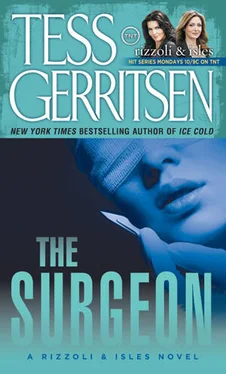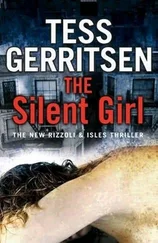“You’re letting them win if you don’t complain.”
“I tried it your way. It doesn’t work. So don’t do me any favors, okay?” She slung her purse over her shoulder and stepped onto the elevator.
The instant the door closed between them, she wanted to take back those words. Moore didn’t deserve such a rebuke. He had always been polite, always the gentleman, and in her anger she had flung the unit’s nickname for him in his face. Saint Thomas. The cop who never stepped over the line, never swore, never lost his cool.
And then there were the sad circumstances of his personal life. Two years ago, his wife, Mary, had collapsed from a cerebral hemorrhage. For six months she’d hung on in the twilight zone of a coma, but until the day she actually died Moore had refused to give up hope that she’d recover. Even now, a year and a half after Mary’s death, he did not seem to accept it. He still wore his wedding ring, still kept her photo on his desk. Rizzoli had watched the marriages of too many other cops disintegrate, had watched the changing gallery of women’s photos on her colleagues’ desks. On Moore’s desk, the image of Mary remained, her smiling face a permanent fixture.
Saint Thomas? Rizzoli gave a cynical shake of the head. If there were any real saints in the world, they sure as hell wouldn’t be cops.
One wanted him to live, the other wanted him to die, and both claimed to love him more. The son and daughter of Herman Gwadowski faced each other across their father’s bed, and neither was willing to give in.
“You weren’t the one who had to take care of Dad,” Marilyn said. “I cooked his meals. I cleaned his house. I took him to the doctor every month. When did you even visit him? You always had better things to do.”
“I live in L.A., for god’s sake,” snapped Ivan. “I have a business.”
“You could have flown out once a year. How hard was that?”
“Well, I’m here now.”
“Oh, right. Mr. Big Shot swoops in to save the day. You couldn’t be bothered to visit before. But now you want everything done.”
“I can’t believe you’d just let him go.”
“I don’t want him to suffer anymore.”
“Or maybe you just want him to stop draining his bank account.”
Every muscle in Marilyn’s face snapped taut. “You bastard.”
Catherine could listen no more, and she cut in: “This isn’t the place to be discussing it. Please, can you both step out of the room?”
For a moment, brother and sister eyed each other in hostile silence, as though just the act of being the first to leave was a surrender. Then Ivan stalked out, an intimidating figure in a tailored suit. His sister, Marilyn, looking every bit the tired suburban housewife she was, gave her father’s hand a squeeze and followed her brother.
In the hallway, Catherine laid out the grim facts.
“Your father has been in a coma since the accident. His kidneys are now failing. Because of his long-term diabetes, they were already impaired, and the trauma made things worse.”
“How much was due to surgery?” asked Ivan. “The anesthetic you gave him?”
Catherine suppressed her rising temper and said, evenly: “He was unconscious when he came in. Anesthesia was not a factor. But tissue damage puts a strain on kidneys, and his are shutting down. Plus, he has a diagnosis of prostate cancer that’s already spread to his bones. Even if he does wake up, those problems remain.”
“You want us to give up, don’t you?” said Ivan.
“I simply want you to rethink his code status. If his heart should stop, we don’t have to resuscitate him. We can let him go peacefully.”
“You mean, just let him die.”
“Yes.”
Ivan gave a snort. “Let me tell you something about my dad. He’s not a quitter. And neither am I.”
“For god’s sake, Ivan, this isn’t about winning or losing!” said Marilyn. “It’s about when to let go.”
“And you’re so quick to do that, aren’t you?” he said, turning to face her. “The first sign of difficulty, little Marilyn always gives up and lets Daddy bail her out. Well, he never bailed me out.”
Tears glistened in Marilyn’s eyes. “It’s not about Dad, is it? It’s about you having to win.”
“No, it’s about giving him a fighting chance.” Ivan looked at Catherine. “I want everything done for my father. I hope that’s absolutely clear.”
Marilyn wiped tears from her face as she watched her brother walk away. “How can he say he loves him, when he never came to see him?” She looked at Catherine. “I don’t want my dad resuscitated. Can you put that in the chart?”
This was the sort of ethical dilemma every doctor dreaded. Although Catherine sided with Marilyn, the brother’s last words had carried a definite threat.
She said, “I can’t change the order until you and your brother agree on this.”
“He’ll never agree. You heard him.”
“Then you’ll have to talk to him some more. Convince him.”
“You’re afraid he’ll sue, aren’t you? That’s why you won’t change the order.”
“I know he’s angry.”
Sadly Marilyn nodded. “That’s how he wins. It’s how he always wins.”
I can stitch a body back together again, thought Catherine. But I cannot mend this broken family.
The pain and hostility of that meeting still clung to her when she walked out of the hospital a half hour later. It was Friday afternoon and a free weekend stretched ahead, yet as she drove out of the medical center parking garage she felt no sense of liberation. It was even hotter today than yesterday, in the nineties, and she looked forward to the coolness of her apartment, to sitting down with an iced tea and the TV tuned to The Discovery Channel.
She was waiting at the first intersection for the light to turn green when her gaze drifted to the name of the cross street. Worcester.
It was the street where Elena Ortiz had lived. The victim’s address had been mentioned in the Boston Globe article, which Catherine had finally felt compelled to read.
The light changed. On impulse, she turned onto Worcester Street. She’d never had reason to drive this way before, but something drew her onward. The morbid need to see where the killer had struck and to see the building where her own personal nightmare had come to life for another woman. Her hands were damp, and she could feel her pulse quickening as she watched the numbers on the buildings climb.
At Elena Ortiz’s address, she pulled over to the curb.
There was nothing distinctive about this edifice, nothing that shouted to her of terror and death. She saw just another three-story brick building.
She stepped out of her car and stared at the windows of the upper floors. Which apartment had been Elena’s? The one with the striped curtains? Or the one with the jungle of hanging plants? She approached the front entrance and looked at the tenant names. There were six apartments; Apartment 2A’s tenant name was blank. Already Elena had been erased, the victim purged from the ranks of the living. No one wanted to be reminded of death.
According to the Globe , the killer had gained access by way of a fire escape. Backing up onto the sidewalk, Catherine spotted the steel lattice snaking up the alley side of the building. She took a few steps into the gloom of the alley, then abruptly halted. The back of her neck was prickling. She turned to look at the street and saw a truck rattle by, a woman jogging. A couple getting into their car. Nothing that should make her feel threatened, yet she could not ignore the silent shouts of panic.
She returned to her car, locked the doors, and sat clutching the steering wheel, repeating to herself: “Nothing is wrong. Nothing is wrong.” As cold air blasted from the car vent, she felt her pulse gradually slow. At last, with a sigh, she leaned back.
Читать дальше












